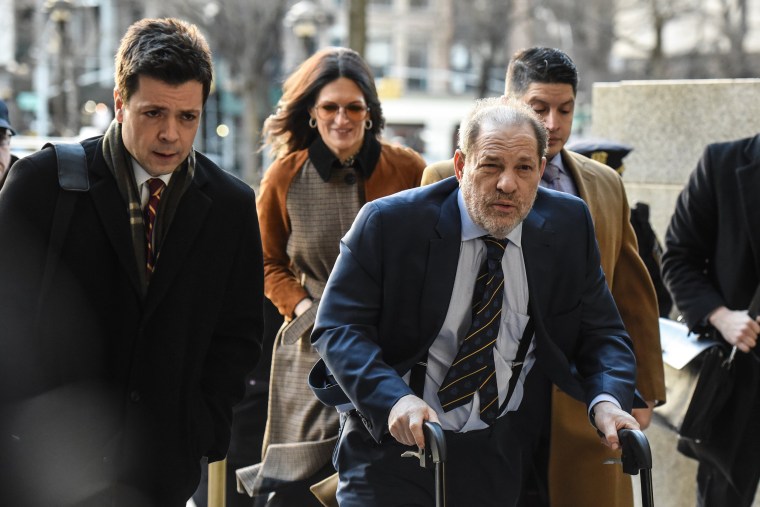The lead prosecutor in Harvey Weinstein's rape trial said during closing arguments Friday that the Oscar-winning producer was a serially abusive "predator" who believed he was so powerful he could manipulate, harass and assault women with impunity.
"The universe is run by me, and they don't get to complain when they get stepped on, spit on, demoralized and, yes, raped and abused by me — the king," said the prosecutor, Joan Illuzzi-Orbon, speaking from the former film mogul's purported point of view and referring to his alleged victims.
Weinstein, 67, who has been accused by dozens of women of sexual misconduct going back decades, is charged with raping Jessica Mann, a former aspiring actress, in a New York City hotel room in 2013 and forcibly performing oral sex on Mimi Haley, a former "Project Runway" production assistant, in his apartment in 2006.
He has pleaded not guilty in the case and denied all accusations of nonconsensual sex.
The trial featured testimony from four other accusers — including "The Sopranos" actress Annabella Sciorra — whose allegations were not the basis for criminal charges but who were called by prosecutors to show that Weinstein used the same tactics to victimize many women.
In her dramatic closing arguments, Illuzzi-Orbon said that with the exception of Sciorra, Weinstein viewed his accusers as "complete disposables."
"They were never going to be in his world," Illuzzi-Orbon said, referring to the elite reaches of the film industry where Weinstein was widely seen as the influential producing powerhouse behind "Pulp Fiction," "Shakespeare in Love" and dozens of other movies.
In one key moment of her closing argument, Illuzzi-Orbon compared Sciorra's description of the time she confronted Weinstein after he allegedly raped her in the early 1990s and Mann's account of how the producer reacted when she informed him she had a boyfriend in 2013.
Sciorra's testimony was displayed on a TV monitor next to the jury box: "His eyes went black, and I thought he was going to hit me right there." Illuzzi-Orbon then displayed the relevant part of Mann's testimony: "His eyes changed and he was not there. They were very black and he ripped me up."
The closing argument comes a day after Weinstein's lead defense attorney delivered a lengthy summation of the case, telling jurors they were the "last line of defense" against "overzealous" prosecutors.
The attorney, Donna Rotunno, told the court that prosecutors had essentially played the role of movie producers, writing a "script" intended to "trick" jurors into finding Weinstein guilty. She implored jurors to use their "New York City common sense" when deciding the case.
"In their universe," Rotunno said, referring to prosecutors, "women are not responsible for the parties they attend, the men they flirt with. In this script, the powerful man is the villain, and he's so powerful and large that no woman would want to sleep with him."
When asked by reporters Thursday afternoon how he felt about Rotunno's closing argument, Weinstein said: "I made 'The King's Speech.' It was a queen's speech."


